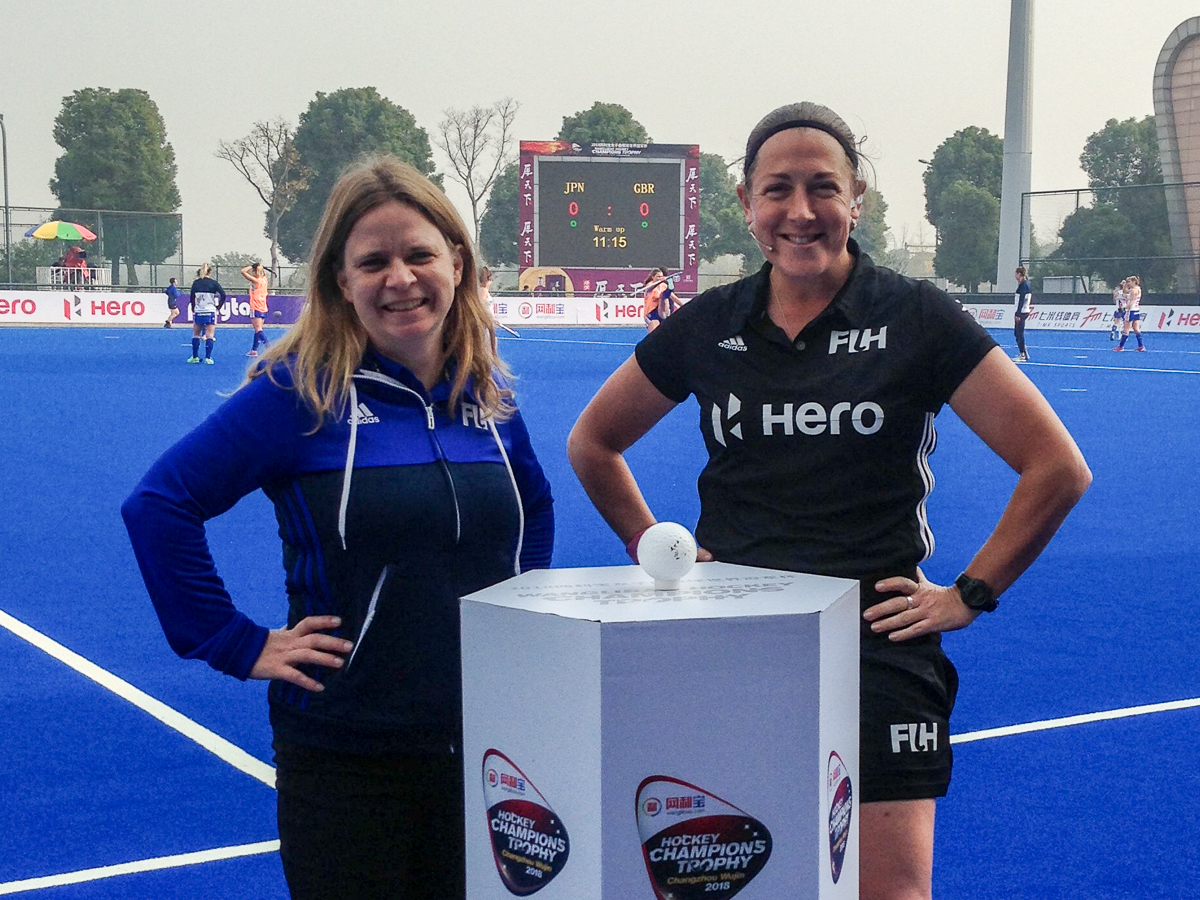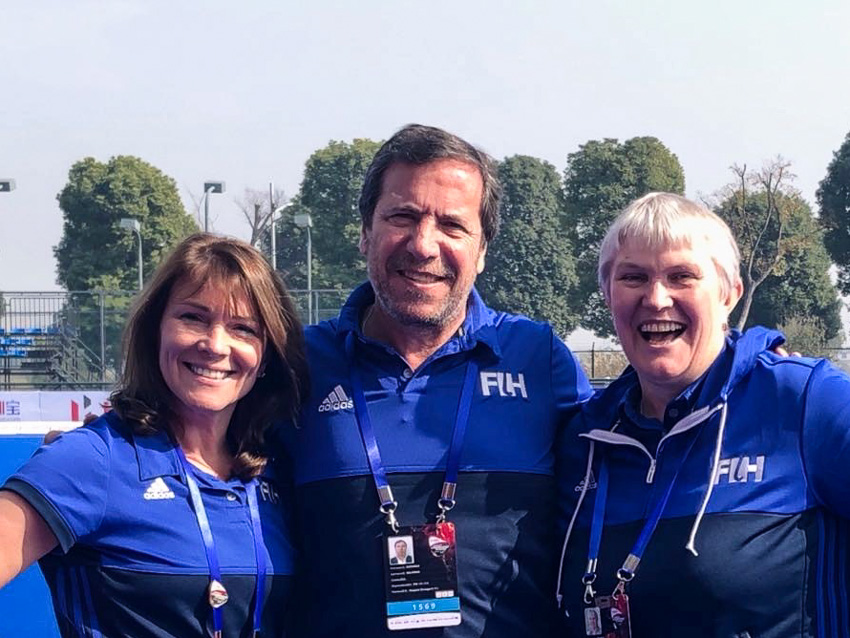
Traveling to a hockey tournament on the other side of the world may seem like a glamorous way to spend a fortnight. Whether it is the World Cup in India, the Hockey League Finals in New Zealand or, as three PAHF officials have recently experienced, the International Hockey Federation (FIH) Hockey Champions Trophy in China, it sounds like a cool gig.
And of course it is! As an official you are one of the vital members of a group of people who make these things happen. The local organising committee will be anxious to look after you, the teams will certainly want to keep on your good side, and you may get to experience a culture and a country that is new to you.
But it is also tough. Being an official at a major event is a pressured position. Quite apart from the fact you have to take time away from your regular job, you are then in a situation where you are dealing with high performance athletes and coaching teams whose position can often be at the mercy of results.
Quite often your decisions can make a difference to a match: sometimes an actual final outcome rests on your shoulders. That is a stressful situation in itself. Then there is the pressure that comes from within. The desire to do a good job; the desire to improve on each performance; the desire to make a positive impact on the game. And that includes bringing what you learn at an event back to your own hockey community.
For Edmundo Saladino (Argentina), Lurah Hess and Suzi Sutton (USA), the Hockey Champions Trophy in Changzhou, China has been an event in their hockey careers that has provided an opportunity for both learning and reflection. "I have had an epiphany," says Suzi Sutton as the three PAHF officials take time out to share a roundtable discussion about their Champions Trophy experience.
Sutton's epiphany concerns the responsibility the three officials feel towards taking their international experience and sharing it with the PAHF hockey community. It is a responsibility that also resonates with both Hess and Saladino: "I am here to represent the PAHF," says Saladino. "The Pan Am support us here, so I want to give back all my experience to the PAHF umpires and help them get to the top level. At this moment, we have a few top umpires, but we need to get more PAHF umpires into the top tier of international hockey. I always use my experience to help guide the PAHF umpires committee. I am always ready to help."
Both Sutton and Hess talk about the need to share information across all the nations of the PAHF region. It is already happening in pockets on the continent but it is also something that can develop and grow. There is an active Facebook page dedicated to the FIH officials in Changzhou, which began life many months before the hockey tournament actually began. As the three officials talked, one very practical outcome was conceived – a communication strategy, similar to that adopted by the FIH, to share information with hockey officials at all levels on the continent. "It is something we must implement when we get back," says Sutton. For her part, Hess was already scribbling down a memo.
The officials also discussed the similarities and differences in hockey provision and delivery that is evident at an international tournament. Hess made the very pertinent point that many continental federations look to the European Hockey Federation as a model of how to run events. In fact, when you are in a country where resources are limited, then the European model might well be highly unworkable. The better option may be not to duplicate the European way but develop another, more appropriate model.
"My roommate here in Changzhou is African," says Hess, as she warms to the theme. "So we are able to exchange information. People tend to look to Europe but they have so many resources, so may opportunities and so many officials. Actually, where PAHF is right now, we have a lot more in common with Africa."
Saladino agrees: "In the Pan Am Cup, for example, you see Argentina and Canada men competing with Guatemala or Brazil. It is not easy to manage that kind of match. You may actually whistle only one half, so as an umpire, you have to work on your concentration levels.
"To be able to talk to countries from Africa or Oceania, where there are similar issues, Vanuatu versus Australia is a good example, that helps you to address these issues."
A recurring theme around the table was about seeing the 'bigger picture'. "We come from this place where we understand how things work in our city or our region," says Sutton. "But you come here [to China] and you have to have a broader understanding of the way everything that you do is interpreted within a different culture."
Hess agrees with her compatriot. "I do a lot of technical development through the USA domestic hockey league and we have an annual technical officiating seminar. Sometimes, at the domestic level, we can get caught up in the detail. Here, I have stepped back and taken a look at the bigger issue. As I reflect, I'm realising, we have a tendency to look at just the minutiae where we should look at the bigger picture."
She pauses, "and that is something else I have realised during my time here: I have learnt to reflect upon things a little more. Taking a moment to consider all angles rather than just diving in. You have to realise some things are out of your control and you can fight that, or you can just go with it."
At Changzhou, one of the things that so impressed the officials was the level of care they received from the hosts. "The hospitality has been above and beyond," says Sutton. "The umpire from the local hockey organisation, Chen Hong, has been amazing because she has been at pains to make sure we enjoy her country, and that is alongside carrying out her own umpiring duties. I think this is one of the nicest tournaments in terms of the things they have provided to make sure the officials can do their job on the pitch."
The other thing that has so impressed at this competition is the involvement of the top-level members of the China Hockey Association. "If I take a step back and take a look at the CHA," says Sutton, "The amount of effort that has gone into organising this tournament is so impressive. There are a large number of people with high level international experience and they are all involved here. I will take that back to PAHF and say 'look, top officials that are just retiring from the game are giving all their experience back to their association.'
"They are making sure that everything they do is in line with FIH rules, there are no exceptions, regardless of the resources available. They really use all their experience from tournaments elsewhere across the world and then use that to achieve perfection here."
The consensus around the table was that to raise standards in your own region, then you needed to be a constant presence at events such as the Champions Trophy and FIH Pro League. "If you want high standards across global hockey, you have to be at the table of international competition," says Sutton. "You can't have the umpire from Asia calling one decision and the umpire from PAHF calling a different – these events help us to standardise."
That said, the three officials agreed that there was more in common across continents than differences. "In the US," says Hess. "We have a perception that things are very different in Asia, but I think the more times you go to hockey tournaments, the more you realise that things are not so different. It is the same routine at the pitch, we are all part of the same hockey family."

